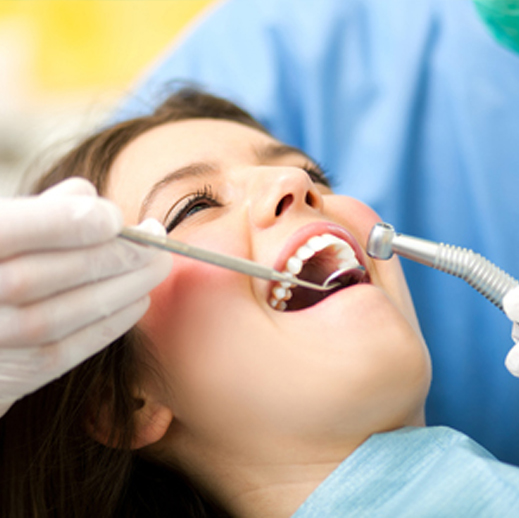- 02 9621 2221
- 2/138 Best Rd Seven Hills, NSW 2147
- info@familydentalpractice.net.au
Preventative Dentistry is when a patient comes in for a dental check-up and cleaning. We start by listening to your concerns or problems. This is followed by a thorough look at your teeth, gums, tongue, and soft tissues in your mouth, whilst concentrating on your main concerns. A comprehensive check-up is often coupled with taking x-rays of the teeth to help us identify any problems that may not be visible to the eye.
At this point, we present to you any important findings. And, put together a customized treatment plan according to your dental needs.
Dental cleaning and polishing consist of the removal of any plaque and calculus from around the teeth and gums.
Fluoride treatment is also applied to help strengthen your teeth against decay.
If required, we will also provide tailored advice on how to improve your dental hygiene. So, that you can continue to look after your teeth and gums in the best possible way.

At Family Dental Practice, we believe that all our young patients require the right dental education to equip them in looking after their own teeth from a young age, starting with the development of correct habits. Children’s dental appointments introduce them to the dental setting in a simple and fun manner to help them get comfortable. We show children how to brush their own teeth and the importance of eating and drinking healthy foods.
Preventative procedures such as fissure sealants are an effective way to protect adult molars from decay as children are building the right dental hygiene habits. Fissure sealants are a quick and painless procedure that places a protective coat over newly erupted molar teeth.
It is also essential that a dentist monitors the eruption of adult teeth to ensure problems are detected early and prevented early.
As soon as teeth start erupting, it is important that parents start to keep a close eye on their children’s teeth so that any changes in appearance can be brought to the attention of a dental professional.
Giving your child an introduction to the dental clinic and dental chair from a young age will help them get used to getting a check-up and clean, and reduce the fear of coming to the dentist.
Dental plaque plays an important role in the majority of dental diseases. Dental plaque consists of a biofilm (community) of bacteria that stick to the teeth’ surfaces. This community of bacteria grows and continually produces harmful acids which lead to dental decay (caries) and gingival (gum) inflammation. This is why it is crucial to remove dental plaque in the form of brushing and flossing.
Smoking has been linked to rapidly progressing gum disease and early loss of teeth. Smoking also reduces the quality of saliva produced which can lead to dental decay. It is also a risk factor for oral cancer. Your dental professional is best equipped to screen and identify suspicious lesions of the oral tissues.
Grinding/clenching is a habit that can occur with or without a person’s knowledge. It can be due to physical or emotional reasons and can lead to sensitivity, loss of tooth structure, broken/chipped fillings, and tenderness in the jaw joints and muscles.
Brushing for a duration of 2 minutes is required to ensure all areas are well-cleaned. It is also worth considering using an electric toothbrush which is more effective in removing plaque from around your teeth and gums than a manual toothbrush.
Brushing alone doesn’t clean all the surfaces of your teeth, which is why flossing is an important part of oral hygiene. Gentle flossing between your tooth contacts helps to keep gums healthy and prevents decay.
Speak to your dentist if you have difficulty brushing or flossing. We are more than happy to demonstrate the correct techniques.
The frequency with which we have sweet snacks and drinks is very important in keeping our teeth healthy. The bacteria in our mouths love to consume the sugars that are in sweet foods/drinks. They produce harmful acids which result in damage to our teeth in the form of dental decay (caries). The more often we have sugar in our mouth, the more decay we tend to see.
Learn more about Dentistry.
Our saliva plays a significant role in our dental health. Saliva helps to re-mineralize our teeth to keep them strong and helps to wash away food debris stuck around our teeth. Poor quality saliva or low saliva flow can be due to a variety of reasons including dehydration, caffeine in tea/coffee, and certain prescription medications.
Drinking water throughout the day is important for our saliva quality and quantity as it rehydrates and reduces dry mouth. Speak to your dentist if you have any questions or concerns about dry mouth.
Consider drinking regular tap water as this contains a very small amount of fluoride. Fluoride in our tap water has beneficial effects on our teeth by strengthening the enamel surface and making it more resistant to dental decay.
Prevention is better than a cure. Discovering a dental problem before it becomes worse means that we can find a way to intervene in a manner that is as least invasive as possible. This also results in lower costs of treatment in the future.